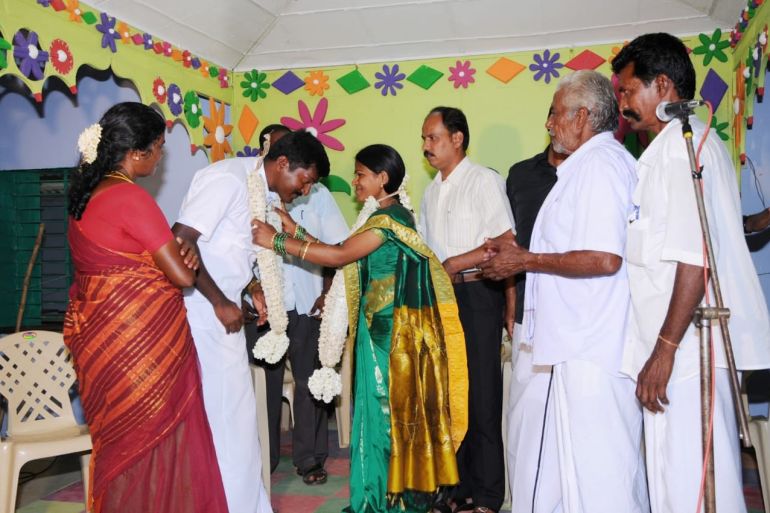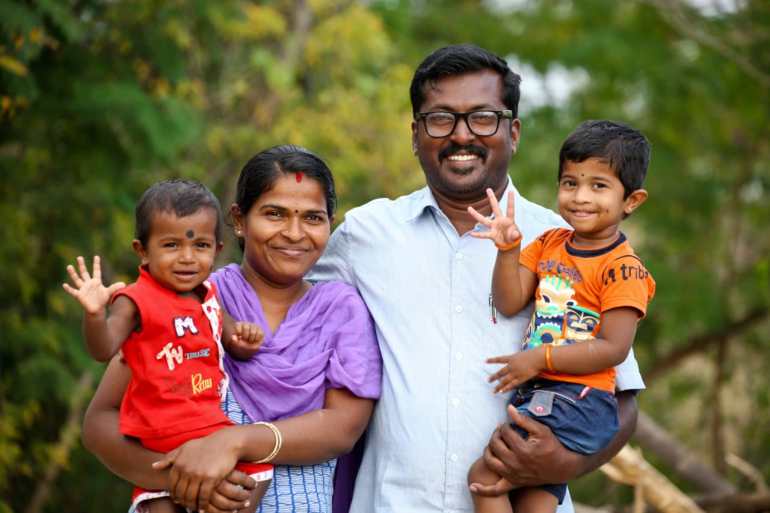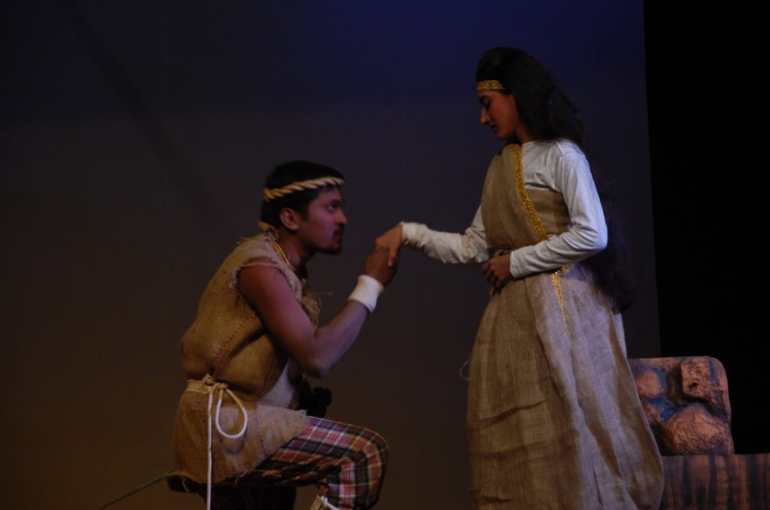400 love letters and a play: How two Indian prisoners found love
A former forest bandit and a trafficking survivor found love – and purpose – while serving life sentences in prison.

At the entrance to a small bright-green house with a wooden door in the village of Kazhuthapali in India’s southern state of Tamil Nadu, sits the King of Love.
That is the literal translation of UA Anburaj’s name. And the 43-year-old lives up to it. The tall, quiet man watches his wife Revathi and their two children – five-year-old son, Agaram, and eight-year-old daughter, Yazhisai – prepare for the local temple festival, and smiles contentedly.
Keep reading
list of 4 itemsFrance prison van attack: All we know about deadly ambush and manhunt
Family says al-Shifa doctor was tortured to death in Israeli prison
The Abu Ghraib case is an important milestone for justice
More than a decade ago, the couple were furiously writing to one another – nearly 400 letters in a handful of years – but neither dreamt they would one day be here: at home, together.
That is because the letters were exchanged between two high-security prisons in the neighbouring state of Karnataka – where Revathi and Anburaj were each serving a life sentence.
“We actually fell in love over letters,” says 32-year-old Revathi, smiling. “I remember how my roommates used to tease me every time a letter came in.”

Heroes and bandits
Decades before the first letter was sent, Anburaj was growing up in Kazhuthapali, a village whose name means “donkey creek”. “It was literally the place where the [forest-dwelling Soliga tribe] from the neighbouring hills used to offload their donkeys to let them drink water from the creek,” Anburaj explains.
His parents were both weavers – his mother Annakodi, 65, still works on her pedal loom, expertly weaving a colourful doormat outside the house while her son speaks. When Anburaj was young, his father wanted him to become a police officer. But the boy had other interests.
“When I was eight years old, I had heard stories of a forest bandit and his gang roaming those very hills. But … none of the villagers had ever seen him,” Anburaj recalls.
The forest bandit – Veerappan – was a notorious poacher and sandalwood smuggler. But many of the villagers and forest dwellers in Tamil Nadu and Karnataka supported him.
“In 1972, India brought in the Wildlife Protection Act to protect the forests and the very next day, the hunting tribes and forest-dependent villagers became criminals,” Anburaj explains.
The newly formed forest department put pressure on the tribes who were dependent on the forest for food, but provided them with no other alternative, he adds.
“There was a huge gap between the government and the forest dwellers – and it led to the rise of Veerappan as a leader who protected forest-dependent tribes from the authorities.”

But while the adolescent Anburaj was curious about Veerappan, he found his hero in someone else – an old village storyteller named Sevi. The wise elder spoke of the way of love, helped solve village disputes and shared moral tales that would capture the attention of the entire village.
But then one day, when Anburaj was 15, something happened that would change both his and Sevi’s lives forever.
Hearing a commotion outside, Anburaj stepped out of his house to see the usually quiet village filled with men dressed in camouflage – part of a special police task force formed to capture Veerappan and his men. The startled teenager slowly moved through the crowded street and there, in the middle of a throng of people, was a naked Sevi, huddled in a foetal position. A group of policemen thrashed the old man with batons as villagers looked on in shock.
Women begged the policemen to stop and, when they eventually did, the villagers quickly clothed the storyteller. The police officials declared that the same thing would happen to anyone who dared to support Veerappan. Anburaj watched as his hero limped back to his hut, not knowing that it was the last time he would see him.
“Sevi thatha [grandpa] never came out to share his stories again, and he died within months,” he says. Sevi’s death had a profound effect on Anburaj, who decided then that he wanted to join the rebels in the forest.
When he was 17, Anburaj got his chance.
He was grazing his sheep in the hills when he encountered Veerappan. The bandit took an instant liking to the inquisitive teenager, taking him under his wing and teaching him the ways of the forest. Anburaj would stand guard for Veerappan, carry his groceries, and do his bidding.
“At that point, I was just Veerappan’s soldier who blindly obeyed his orders. I would beat up anyone he asks me to,” he recalls, recounting his involvement in two offences where the gang kidnapped forest officials and two freelance photographers for ransom.
But, just three years after he joined them, Veerappan asked Anburaj and some other bandits to surrender to the police as a part of his reconciliation efforts with the state government, which he said had promised them amnesty in exchange for their surrender. Anburaj did as he was asked and remembers bidding a teary-eyed Veerappan farewell.

The state government backed out of its commitment, however, and put Anburaj and the other bandits on trial. Veerappan – who did not surrender because he wasn’t sure the government would honour its promise – went on the run until he was ambushed and killed by state police in 2004.
Anburaj was 20 years old when he was sentenced to life in prison for aiding the forest brigade and being an accessory to kidnapping.
“When the judge read the statement that said I had to serve my sentence ‘until my last breath’, it felt like a death knell,” he says.
When fate draws a path
“[In prison] the food, water, everything was abysmal. The worst part was we were given two bowls: one to eat on and another to collect our excreta; we had to dispose of it ourselves the next day,” he says.
The lack of basic human dignity shocked Anburaj, who responded by organising peaceful protests requesting better sanitation facilities. His legal petitions would later pave the way for improved toilet facilities across the state’s prisons.
When he was not protesting, Anburaj was reading. Papillon by Henri Charriere – a novel that explores the title character’s imprisonment and subsequent escape from a French penal colony – hit particularly close to home. Like its hero, Anburaj felt that the punishment for a crime he had committed as a juvenile was too harsh.
“Like Henri, I was not ready to spend the rest of my life in prison, so I hatched plans to escape its towering walls,” he says.
But while trying to find ways to surmount his physical obstacles, Anburaj met “a renowned theatre director who had come to organise plays for prisoners” – and his plan changed.
As plays were often held outside prison grounds, Anburaj volunteered to set up a team of actors and theatre technicians in his prison, hoping that this would be his ticket to escape.
It did free him, but not in the way he had anticipated.

Before they could begin work on the plays, inmates were asked to attend workshops where they did things like paint, craft clay models, and dance. “The idea was to bring out the mindset of a child in each one of us, which it did. I had never held a brush or canvas in my life yet I painted two huge canvases, immersing myself in the experience for three whole months. As a prisoner, we do not get to see the sunrise or sunset inside the prison so I created a painting of a warm sunrise,” Anburaj recalls.
Over the next six months, he was swept into the world of theatre. Each script and character spoke to his soul. “When I read the scene where Lady Macbeth cries in anguish about her inability to wash the scent of blood from her hands, I could connect to the guilt she felt.”
Anburaj felt a need to hug his victims and to ask for their forgiveness. He believed it was necessary for every prisoner to feel that sense of guilt in order to reform themselves. He was also heavily influenced by the teachings of Mahatma Gandhi, reading close to 150 books on the revolutionary’s life as part of his preparations for a play about Gandhi’s wife, Kasturba.
In the men’s prison, female characters were usually played by male prisoners. But when his theatre team had to put on a play called Madhavi – a scathing commentary on patriarchal society – he felt that only a woman could do justice to the role.
So in 2008, he wrote to prison officials requesting that female prisoners be allowed to perform in the prison theatre. His petition was accepted and 12 female prisoners from a nearby facility joined their group of performers.
That is when he met Revathi.
A chance at a future
When Revathi was three years old, her mother died. Soon after, her father abandoned her. So she lived with her grandmother in Chennai. But when she passed away, 14-year-old Revathi chose to stay with the family she worked for as a house helper.
A year later, that family relocated to Bengaluru, the Karnataka capital, taking Revathi with them. But within six months of the move, they had sent her to work for an elderly lady in a posh apartment in the city.
“I was shocked when one day that lady nonchalantly declared that I was sold to a prostitution ring in Mumbai. My stomach churned, I knew that there was absolutely no one to save me,” Revathi recalls.
She claims that when she shouted for help, the woman stabbed her in the stomach and arms. She says she managed to grab the knife from her and “attacked her back”.
Revathi recalls how the woman “sunk in a pool of blood”.
“I passed out before I realised what had just happened.”
Three days later, the 16-year-old woke up in hospital. That is when she learned that she was to be tried for murder.
Revathi was convicted and sentenced to life in 2003.

She played the scene out in her mind over and over again, wondering if she could have done anything differently. But there she was in a white sari – the uniform worn by female prisoners – that declared her a criminal to a world she barely knew.
During her first year in prison, she did not talk to anyone. She fell into depression. Then, a few years into her sentence, a prison official encouraged her to join a theatre group in the women’s prison.
After prison officials approved Anburaj’s request in 2008, the female inmates began practising along with their male theatre counterparts under a large tree in the garden of the men’s prison. After their workshops and rehearsals ended, the women’s and men’s groups would then return to their respective prisons.
When Revathi first arrived with the other female inmates, Anburaj hardly noticed the quiet young woman.
Revathi kept to herself as she could not speak the local language – Kannada. It took her days to figure out that Anburaj was in fact from her home state, Tamil Nadu, and spoke her mother tongue, Tamil, fluently. Slowly, she began opening up to him.
“One day, I was asked to craft something in clay as part of our theatre workshop at the men’s prison. I chose to mould a statue of a mother. Having lost my mother at a young age, it was the first image that came to my mind,” she says.
She became overwhelmed with emotion and Anburaj, who was the assistant director for the prison theatre initiative, helped her finish the statue.
A friendship blossomed between the two. “We only spoke a few words in person but he wrote to me extensively. His words were always kind and soothing,” Revathi smiles.
The workshops and practice sessions allowed them to meet for five days a week over a period of 11 months.

Their conversations evolved into long discussions about the characters in their plays and the challenges of their lives before they were imprisoned. “I had studied only till class four so I could hardly write. He, on the other hand, wrote mellifluously. In fact, I learned to write from him,” she laughs.
When prison officials considered releasing Revathi for good behaviour, and she worried about where she would go, Anburaj assured her that she could go to his family. His mother and siblings would treat her like their own, he insisted. That was the moment Revathi knew that Anburaj was her future.
For Anburaj, Revathi was someone who shared his vision. “I knew that I wouldn’t just step out of prison and take care of just my family. I needed someone who understood my ideology. Whatever was denied to us, I wanted to try and give back to those we can,” he explains.
“As a person who has been a victim herself, I had seen Revathi stand up for common good even inside the prison grounds. She had petitioned to bring sanitary napkins for women prisoners. She was empathetic and is my equal in every sense of the word.”
Abundant love
In 2011, three years after they met, while both were on parole – temporary release given to prisoners based on good behaviour – they got married. Four years later, while Anburaj was away performing at a Bengaluru theatre festival, Revathi bore their first child while in prison – a tiny, premature baby girl.
Anburaj and his prison supervisor rushed overnight to see the newborn in a private hospital in Mysuru. “The minute I held her I felt immense joy and hope. There was also this sense of huge responsibility on my shoulders. It was not about pampering her or giving her wealth or education. I just wanted to provide that little girl with the best environment to let her fly and let her be,” he said.
The next day, Revathi returned to prison with the baby.
Six months after giving birth, and after 14 years in prison, Revathi was released for good behaviour. Anburaj was released a year later, after spending two decades in prison.
The couple moved to live with Anburaj’s parents in Kazhuthapali.

With some help from friends, Anburaj set up an oil processing unit and later expanded it to an organic shop that sells vegetables, groceries, honey, oil and handicrafts. He continues to go back to the prison where he was imprisoned, to organise plays for inmates. Revathi has plans to set up a separate theatre unit in a women’s prison, and the two are trying to create similar programmes in other states as well.
Revathi says they are hardly romantic in conventional ways. “In all these years, he has gifted me a sari and I have given him a peaceful Buddha statue, which he keeps on his table at our shop,” she smiles.
“Only love has transformed us into humans and we feel it is necessary to bring this peranbu [abundant love] to the world around us,” says Anburaj.
Having witnessed the challenges that underprivileged forest tribes experienced during his time with Veerappan, Anburaj has helped set up a tribal cooperative society that works towards marketing sustainable forest resources and is in the process of creating a school curriculum based on native ecological knowledge.
Revathi often accompanies her husband on his trips to meet the tribal communities in the neighbouring Thamaraikarai Hills and says she loves to see him transform into a little child as he animatedly shares his stories with people there.
“Our love story has never been just about us,” she declares. “All I wanted was love, and now, I feel it abundantly.”